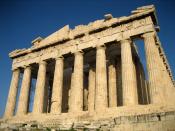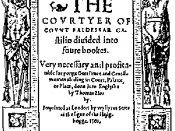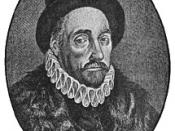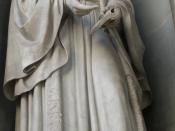At the height of their respective era's Greece and Rome were centers of education and learning. Both societies created great works of philosophy and science that remained unimproved for many centuries. However, this brilliance was lost with the fall of the Roman Empire, and through out the Dark Ages learning was almost completely nonexistent. Then, with the genesis of the Renaissance education began anew. Education ceased to be a thing of privilege, as it had been during the Middle Ages, and became available to a wider range of people. The revival in education during the Renaissance sought to instill the values of humanism and create well-rounded men competent in many fields. However, in the 17th century these values were questioned and altered.
Around the time of the beginning of the Renaissance a movement know as humanism developed. It was a philosophical and literary movement focused on the secular value of the classic works, or the humanities.
Italian writers such as Dante and Petrarch helped to establish the movement by not only translating the classical works of Greece and Rome, but also by contributing original ideas. As the dominant movement in Europe at the time, it is logical that humanist values would have a profound effect on education. An Italian humanist educator, Guarino, asserts the importance humanists place on the Humanities, calling them the "pursuits and activities proper to mankind." Another Italian humanist, Piccolomini, wrote that while they were able to attain enlightenment through the studies of grammar and rhetoric, he says that the more important aspect of education is the study of Philosophy and Letters. The future pope claims that it is the study of the work of the ancient Greeks and Romans that allows correct judgments about the past, present, and future to be made. Written in a book about education, he affirms the humanist view that classical works are of paramount importance to the education of men. Famous humanist Desiderius Erasmus declares "the whole of attainable knowledge liesâ¦" in the ancient texts. These humanists clearly show the values they were trying to impart through education.
Renaissance educators also had a clear vision as to the purpose of education. Their goal was to create well-rounded men educated in the liberal arts. As Castiglione wrote in The Book of the Courtier, one should not only be learned in the humanities, but also in writing verse and prose. He claimed the ability to write in the vernacular was useful to entertain the ladies and judge the writing of others. Castiglione's vision of the courtier as described in his 1528 book later became the definition of a "Renaissance Man". While this term was not assigned until much later, it is evident that Renaissance educators saw the importance of creating learned, well-rounded students to fit that mold. Writing in his memoirs, an Italian statesman, Francesco Guicciardini, laments that he did not spend more effort on skills that might appear to be decorative, but in reality he says, "open the way to the favor of princes, and sometimes to great profit and honors." Guicciardini candidly admits to the importance of these qualities, affirming Castiglione's idea of the Renaissance man. French essayist, Michel de Montaigne makes a comment that supports that the theory that the education system's purpose was to create Castiglione's Renaissance man. He states that the goal of the educational system was, "to make us, not good and wise, but learned; and it has succeeded." While Montaigne is taking exception to the fact that the educational goals were simply to created learned men, it shows that this was an important objective of educators.
While the humanist values and purposes of education were seen by many contemporaries as correct and "proper to mankind", as stated by Guarino, others saw this type of education as, at best, incomplete. There were different opinions regarding the shortfalls of Renaissance education. For instance, some felt, as evidenced by an excerpt from the School Ordinances of Wurttemberg, that parents should send their children to school not only for an education in the liberal arts, but also to learn a fear of God. This represents a transformation of the secular education preferences of the humanists. Another example is an attack on the British school system by John Brinsley, an English schoolmaster. He says that, "in most of our common schools, the scholarsâ¦have little sense of the meaning and true use of learningâ¦" He adds, "When they go to universities, they waste their friends' money and their own precious time." This is a direct challenge to one of the goals of Renaissance education; creating a man "not good and wise, but learnedâ¦" as asserted by Montaigne. Attacks on the purposes of the system of education appear in the seventeenth century. A Frenchman challenges the usefulness of having an abundance of educated persons, say that having too many schools is a bad thing and "the study of literature is appropriate only to a small majority of men." This conflicts with the accepted idea of creating well rounded, learned people. He is saying that only a small number are needed. Also, an educational reformer in Bohemia calls schools a "disease" and claims that the learning is not accommodated enough to the uses of life. Comenius' statement argues that the schools are not teaching what the students need to know for their lives, which is again, another purpose of Renaissance education.
A pillar of the Renaissance was the revival of classic Greek and Roman learning. As the classic manuscripts of ancient philosophers were rediscovered, so to was a system of education. The values of humanists strongly influenced education during the Renaissance. Also, educators strove to create well-rounded individuals. As time passed, some began to question these values and purposes. However, none can doubt the importance of Renaissance education.





